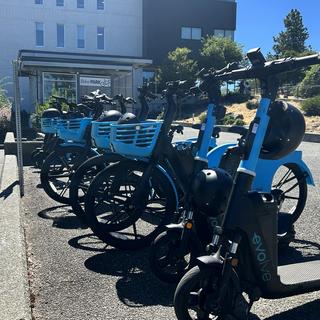Learning to use your time more effectively can make all the difference in university
In the transition back to in-person learning, many VIU students have expressed that they feel as if they have significantly less time for their commitments and often struggle to manage their time. What exactly is time management? It is the ability to use time effectively and it is considered a skill, so it can be learned and strengthened!
Time management “is what we do to plan and divide our time between activities,” says Shelley-Anne Gajda, Coordinator for Peer Supported Learning (PSL) at VIU. “We manage ourselves and our use of time – there is still only 24 hours in the day.”
Shelley-Anne Gajda’s insights as a leader and coordinator on campus can help us to build our toolkit for managing time and using it to our greatest advantage.
What do you have to do to manage time effectively?
Gajda emphasizes that “it really starts with identifying your needs, your time wasters and the reason you jump into time wasters. For instance, I notice that in the middle of working on a project or a document, I will pick up my phone … Why? Probably because I am either bored of that project or I have hit a roadblock and I am not sure what to do at that point.”
Set goals for yourself, take note of deadlines for your deliverables, start with the smaller tasks and break up larger tasks whenever possible to stay motivated, then create a schedule and use checklists while you work. Also learn how to use breaks wisely, leverage available technologies and ask for help early. After each milestone, reward yourself! Here are some examples:
- Goals: use an app to find out how much time you spend being unproductive on your phone. Set a goal to cut it down by an hour each day. By doing so, you will already free up seven hours per week for other activities.
- Deadlines: use your course outlines to write out deadlines for quizzes, assignments, exams, discussion posts and more on a chart or calendar.
- Scheduling: this can be as broad or as finite as you like, but consider activities like lecture periods, study time, working hours, social activities, exercise time, family time, cooking time, creative time, personal time, etc.
- Breaks: be intentional. Some of your breaks can be used for errands or housework, but some should be reserved exclusively to rest, relax and do nothing at all.
What are some of the technologies and tools for time management available?
While technology can often be a major source of distraction, there are tools, apps and software that can help you to perfect your time management. Be sure to take advantage of one of the many hundreds of tools available. Three highlights for your time-taming toolkit are:
- Rize: a desktop software that provides valuable time management insights by tracking how many hours you’ve worked in focus or switching between tasks and which websites distract you most.
- Notion: a web-based productivity tool and app that allows users to manage projects, note-take and coordinate objectives, deadlines and assignments between individuals and teams.
- 135List: a desktop app and web-based day-planning tool that allows you to create lists based on the 1-3-5 rule each day: one big task, three medium tasks and five small tasks to help you stay organized and prioritized.
Be sure to use tools and technologies in an effective way – you can still consider it poor time management if you spend all your time writing to-do lists and schedules without getting your work done!
“I don’t use any of the technologies – I say I am going to and then I don’t get around to it,” says Gajda. “Some of these tools can actually be a time waster or easy ways to procrastinate instead of just getting things done. By the time you set up your to-do-list and calendar and enter it all into a spreadsheet, you could have just been getting things done off of your to-do list.”
She suggests using timers and methods like the Pomodoro Technique (breaking your weekday into 25-minute chunks separated by five-minute breaks) to stay focused and avoid time-wasting.
“Students are really smart, they know how they spend their time and what they do when they are procrastinating – it’s really just being honest about it with yourself and then setting some strategies that will make you more accountable for how you use your time.”
How can VIU help?
On the Learning Matters webpage there are resources to help you become a better learner, get the most from your classes and find support. Gajda strongly encourages you to explore these resources and highlights the Manage Time and Concentration webpage for tips, tools and strategies for your success. She also suggests speaking with an Advisor, as many of them will have tips on managing your use of time.
How are goals and priorities related to time management?
“They really are the foundation of managing oneself,” says Gajda. “If something is important to you then you will make time for it, but when it is something you just have to do, it can be easier to put it off.”
If something is important with a tight deadline, get it done first, says Gajda. If your task impacts others it usually goes up in priority.
How do you tell if your time management strategy is working?
Time management is a skill that you can always work to improve. Progressing skills like organization, delegation, prioritization and communication will contribute to effective time use overall.
When you’ve implemented a good time management strategy, Gajda says you will feel more in control of yourself, less stressed, likely get better sleep, make decisions easier and feel less guilt about saying yes to more free time activities.
“If you don’t put things off, you are better able to handle those unplanned-for, inevitable disruptions,” says Gajda.
Top tips for breaking out of time wasting and procrastination
Time management experts agree that commitment and consistency are sure to help you achieve success. Try:
- Breaking down big tasks into more manageable pieces in advance.
- Planning out each day at the beginning or end of each week.
- Scheduling regular productivity hours during each weekday and giving yourself time off.
- Minimizing distractions by maintaining a quiet, functional workspace and turning off notifications on your phone.
- Cutting down on commitments that don’t align with your goals and priorities.
- Being flexible and realistic with your strategy and having a contingency plan for when the unexpected happens.
Remember that it’s okay to ask for help and be honest with yourself. You are your own ally or enemy in your time management, so treat yourself with kindness, understanding and encouragement!
Samantha Allan is a first-generation learner of Indigenous and British ancestry with home roots across the province of BC. She is currently a Bachelor of Business Administration, Major in Management student at VIU and her long-term goal is to work in law and economic development.




